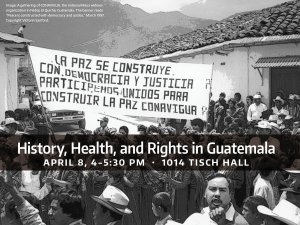Presented By: Center for Latin American and Caribbean Studies
History, Health, and Rights in Guatemala

This panel brings together the historian who discovered that the United States conducted sexually transmitted disease (STD) experiments in Guatemala in the 1940s and a leading anthropologist with 25 years of experience investigating human rights abuses and genocide in that country. They will discuss their contributions to uncovering violations of health and human rights in Guatemala, and connect their vital work to contemporary global issues of transitional justice and medical ethics.
Panelists:
SUSAN M. REVERBY, Marion Butler McLean Professor in the History of Ideas and Professor of Women's and Gender Studies, Wellesley College
“Is Apology Enough? Putting the U.S.-Guatemalan STD Research in Historical and Human Rights Context”
It has not been uncommon in fiction (Sinclair Lewis’ Arrowsmith) or fact (U.S./Guatemalan research on STDs that involved infecting without consent) for questionable medical research to be agreed to by developing world physicians anxious to improve the health care of their populace. Based on my experience as an historian who brought the STD experiments in Guatemala to light, I will discuss how we come to understand this research as immoral as we link health rights to human rights. I will ask if just condemning these studies, or even apologizing for them at a high governmental level, is enough and what we might do to prevent their recurrences.
VICTORIA SANFORD, Professor & Chair Department of Anthropology and Director of Center for Human Rights and Peace Studies, Lehman College-The City University of New York
“Anthropological Methods for Documenting Human Rights Violations and Genocide”
When asked why exhumations of mass graves were important for human rights investigations, the late, great Dr. Clyde Snow famously said, “The bones don’t lie.” From Argentina to Guatemala, Iraq to Sri Lanka, Mexico to Congo, and many other corners of the world, Dr. Snow investigated massive human rights violations and trained a new generation of human rights investigators. In the process, he built a new role for anthropology and anthropologists to investigate and document human rights violations for legal processes in truth commissions and courts as well as for the production of historical memory for society and reclaiming of historical subjectivity for victims and survivors.
Drawing on 25 years of experience investigating human rights violations and genocide in Guatemala, I will discuss the theory and practice of forensic exhumations, victim identification, archival and testimonial research and their interplay in legal processes and community desires for justice. I will explore the ways in which science, law and justice complement and collide with one another as investigations move forward from the field to legal courts and the court of public opinion. I consider the role of the researcher as both documentarian and participant in the production of history as well as legal precedence.
Moderator: SUEANN CAULFIELD, Associate Professor of History, University of Michigan
Co-sponsor: Program in International and Comparative Studies; Human Rights Initiative; Science, Technology & Society
Panelists:
SUSAN M. REVERBY, Marion Butler McLean Professor in the History of Ideas and Professor of Women's and Gender Studies, Wellesley College
“Is Apology Enough? Putting the U.S.-Guatemalan STD Research in Historical and Human Rights Context”
It has not been uncommon in fiction (Sinclair Lewis’ Arrowsmith) or fact (U.S./Guatemalan research on STDs that involved infecting without consent) for questionable medical research to be agreed to by developing world physicians anxious to improve the health care of their populace. Based on my experience as an historian who brought the STD experiments in Guatemala to light, I will discuss how we come to understand this research as immoral as we link health rights to human rights. I will ask if just condemning these studies, or even apologizing for them at a high governmental level, is enough and what we might do to prevent their recurrences.
VICTORIA SANFORD, Professor & Chair Department of Anthropology and Director of Center for Human Rights and Peace Studies, Lehman College-The City University of New York
“Anthropological Methods for Documenting Human Rights Violations and Genocide”
When asked why exhumations of mass graves were important for human rights investigations, the late, great Dr. Clyde Snow famously said, “The bones don’t lie.” From Argentina to Guatemala, Iraq to Sri Lanka, Mexico to Congo, and many other corners of the world, Dr. Snow investigated massive human rights violations and trained a new generation of human rights investigators. In the process, he built a new role for anthropology and anthropologists to investigate and document human rights violations for legal processes in truth commissions and courts as well as for the production of historical memory for society and reclaiming of historical subjectivity for victims and survivors.
Drawing on 25 years of experience investigating human rights violations and genocide in Guatemala, I will discuss the theory and practice of forensic exhumations, victim identification, archival and testimonial research and their interplay in legal processes and community desires for justice. I will explore the ways in which science, law and justice complement and collide with one another as investigations move forward from the field to legal courts and the court of public opinion. I consider the role of the researcher as both documentarian and participant in the production of history as well as legal precedence.
Moderator: SUEANN CAULFIELD, Associate Professor of History, University of Michigan
Co-sponsor: Program in International and Comparative Studies; Human Rights Initiative; Science, Technology & Society